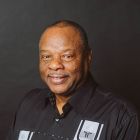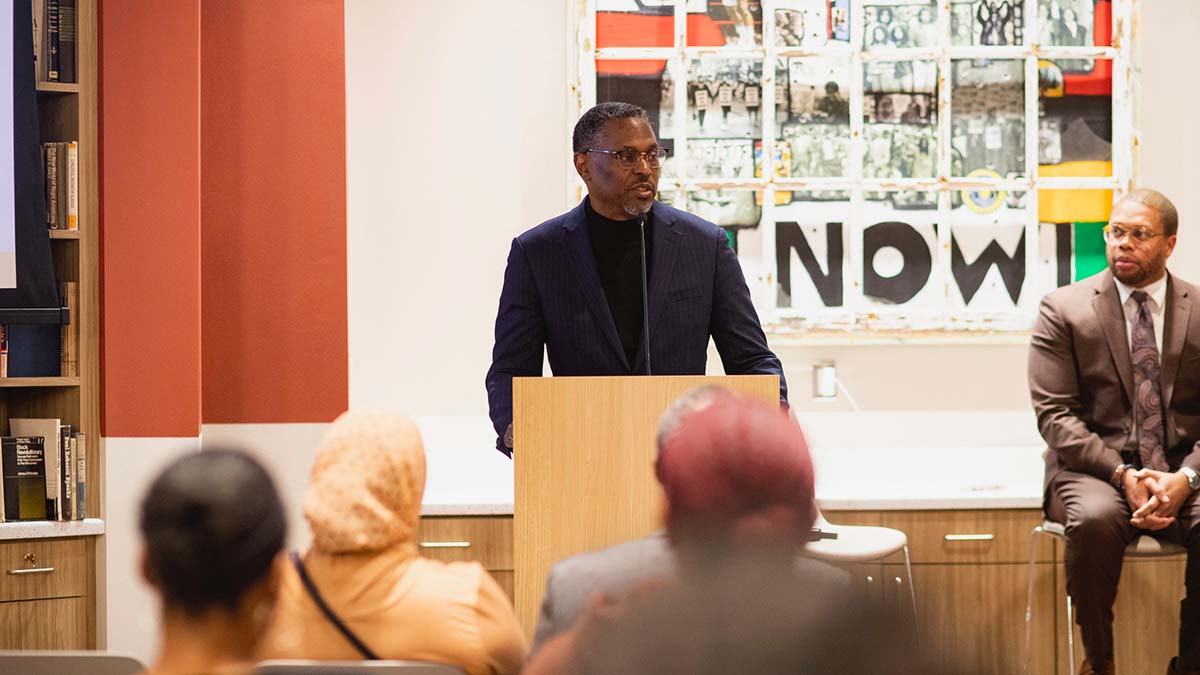Contributing Author/s

Molefi Kete Asante Ph.D.
Temple University Africology: A Legacy of Producing World-Class Scholars and Transformative Research
Temple University Africology: A Legacy of Producing World-Class Scholars and Transformative Research
The Department of Africology at Temple University is one of the few iconic departments in the nation, because of the incorporation of a Black Studies doctoral program in 1988. The first thirty-five students brough a spirit to the campus that was transformative. Among the notable professors who taught at Temple University during the early years are Thelma Ravell, Kariamu Welsh, Terry Kershaw, James Ravell, Alfred Moleah, Tran Van Dinh, Theophile Obenga, Molara Ogundipe-Leslie, Rita Smith, Barbara Hamilton, Sonia Sanchez, Yosef ben Jochannon, Maxwell Stanford, C. T. Keto, and Charles Fuller.
In this article, I want to memorialize key historical points in the department’s trajectory of the department. Contributions by our faculty have included significant editorships, including the long-time editing of the most prestigious journal in the field, the Journal of Black Studies, the publication of The Encyclopedia of Black Studies, the editorship of The Handbook of Black Studies, and the comprehensive two-volume Encyclopedia of African Religion. Our faculty members contribute to numerous of journals, publish important books and articles, and remain engaged in the profession at the highest levels.

Photography By: Ryan S. Brandenberg – Rev. Gregory Holston, senior advisor on policy and advocacy in the Philadelphia District Attorney’s Office, spoke about the district attorney’s racial injustice report during the recent town hall.
Africology and African American Studies Department at Temple University: A Survey from 1984-2022
The size of the Africology and African Studies Department at Temple University has varied from a low of six faculty members to a high of thirteen, but the one constant has been a disciplinary focus and commitment to intellectual diversity. Faculty members are committed to class interests, others to gender interests, and still others to race interests or a combination of intersectional convergences, yet the common theme in the work that we do is Afrocentricity. We seek to center Africans in every phenomenon, advancing our discipline both as, our founders saw it, a critique and a corrective to the received curriculum. Students come to our department from every corner of the world, and they embark, alongside the faculty, on a journey for emancipatory knowledge.
Our educational mission is interwoven with dedication to community responsibility and academic excellence, training the next generation of Africana Studies scholars. We welcome your interest, your visit and urge you to engage the research and teaching that constitute our best efforts at restoring and repairing societies.
In 1967, Temple students flooded Broad Street in North Philadelphia for hours to demand that the university be more responsive to African American issues. Their voices were heard, and in 1971, Temple University established what eventually became the Department of Africology and African American Studies. It was one the first Black studies programs in the country and the first to offer a doctoral program.
In 1984, Temple’s President Liacouras told Molefi Kete Asante, then the chair of the Department of Communication at SUNY Buffalo, and Editor of The Journal of Black Studies: “Philadelphia is a great city, and it’s majority African American, so there is no reason why Temple University should not have the best African American studies program in the nation.”
Asante succeeded Odeyo Ayaga, a Kenyan political scientist, and a strong Pan-Africanist, as the department’s leader. From 1984 onward, one of the main goals became strengthening bonds with the local, national and international African and African American communities. C. Tsehloane Keto, from the history department, moved to African American Studies Department adding his expertise to a strong team that included Ayaga, Alfred Moleah, Tran Van Dinh, and Molefi Kete Asante. The first person hired outside Temple under Asante’s leadership was Sonja Peterson-Lewis, making the start of a deliberate effort to ensure female representation in the faculty.
Initially called the Afro-Asian Institute in 1971, the university’s first Black studies department, chose a name to include Black Americans identified as Asiatic Black. The term “Asiatic” was also fitting because many Blacks in the movement identified with the struggle of the Vietnamese people during the Vietnam War. The following year the department was renamed the Pan-African Studies Department and later created a community education program called the Pan African Studies Community Education Program founded by the community activist by the Annie D. Hyman in 1975.
Since the first graduate, Adeniyi Coker, earned his doctorate in 1991, Temple has produced more doctorates in Africology and African American Studies than all other departments combined. The department has, often through turbulence, created a rich legacy that has added more substantially to the discipline of African American Studies than any other department in the nation. The Afrocentric orientation, which emphasizes studying the African phenomena through the lens of African agency, distinguishes Temple’s program. Africology is more than a collection of courses about black people; it is a specific approach to capturing interpretation, analysis, and explanation from the viewpoint of African people as agents.
The program has produced world-class scholars and leaders. Temple graduate Victor Okafor of Eastern Michigan University pioneered the departmental name Africology after it was relinquished by University of Wisconsin Milwaukee. Miriam Maat Ka Re Monges wrote the first Afrocentric book on ancient Kush, Kush: The Jewel of Nubia. Reiland Rabaka, established the Center for African American Culture at the University of Colorado. Greg Carr, a long-time chair of Africana Studies at Howard University, regularly takes students to the Nile Valley as part of their educational experience. Marquita Gammage and Adisa Alkebulan, are chairs of departments at San Diego State University and California State University Northridge, respectively. Serie McDougal, at CalState-Los Angeles, is now the series editor for UWP’s new research books series. Timothy Sams is President of SUNY Old Westbury. Christel Temple, editor of the Journal of Black Studies, and winner of the MacArthur Genius Grant Ibram Kendi are also a graduates of the Department of Africology at Temple University. Others too numerous to name have also distinguished themselves and the field.
Following the department’s evolution over the last five decades has also provided a reflection of the social evolution of our country. During its Golden Years the department supported a discipline. The epistemological change brought into existence by the department gave us the idea that the Afrocentric study of African and African American phenomena was a transgenerational and transcontinental project, using a disciplinary approach with many different interests. Transgenerational could be researching Africans dating back to 4000 B.C. And transcontinental could be learning about Africans throughout the world’s continents, like in Asia, South America, North America and Europe
Soon after the murder of George Floyd, I appealed to Temple University’s president, Richard Englert, in 2021 to create the Temple University Center for Antiracism. The Vice President for Administration set aside additional funds for architectural changes in the space within the department. It was dedicated to understanding racism and solving problems of racial inequity and injustice. Three million dollars was set aside to bring this vision to reality. The committee by Marguerite Anglin included Nah Dove, Belinda Wilson, Molefi Asante, Marc Getty, Julie Wiley, and Ian Smith met for a year planning the shape, color scheme, dimensions, and renovations needed for Gladfelter Hall. During the dreaded days of Covid this committee established a strong plan and saw its implementation. The project had its detractors, and it was not without resistance and resentment, but it was eventually done. Attorney and Professor Timothy Welbeck was appointed director of the Center.
On November 14, 2022, a grand opening for the center was held, and was chaired by Pennsylvania State Senator Sharif Street (D-Philadelphia) and Pennsylvania State Representative Malcolm Kenyatta (D-181), who had helped secure $1.3 million in state funding for the center’s construction. Sage Publications made a $100,000 grant in the name of Molefi Kete Asante to the department for the top Afrocentric doctoral students based on grades and research work.
Among the first students to have received the Sage Asante Award, the top award in the department, were Rasheed Atwater, Carm Almonor, Courtney Carr, and Michelle B. Taylor. Prior to the Sage grant, the department had received a $60,000 grant reserved for M.A. students, from the parents of Stephen Couvillion, a master’s student from Louisiana, who passed away during his MA program.
Emerging from the struggle for social, academic, and cultural justice on campus five faculty members (Jabali Ade, Nah Dove, Reynaldo Anderson, Kimani Nehusi, and Molefi Kete Asante) formed the Afrocentric Collective which now has membership throughout the globe.
Notable Alumni from Temple University’s Department of Africology
Niyi Coker, CLA ’91, is the first student to receive a PhD in African American studies at Temple. He is a professor and is the former director of the School of Theater, Television and Film at San Diego State University.
Timothy E. Sams, CLA ’10, is president of the State University of New York College at Old Westbury.
Daryl Zizwe Poe, CLA ’00, is founder of the new African Studies program at Lincoln University, and author of major works on Kwame Nkrumah.
Suzuko Morikawa, CLA ’01, is professor of history and African American Studies at Chicago State University where she had been a mainstay of the program in Africology.
James Naazir Conyers, CLA, ’92, wrote and edited more than 40 books and was an important mentor of scholars at the University of Houston.
Greg Carr, CLA ’98, was the long-time chair of the Department of Afro-American Studies at Howard University.
Christel N. Temple, CLA ’99, is the editor of the Journal of Black Studies and was the chair of the Department of Africana Studies at the University of Pittsburgh.
Ibram X. Kendi, CLA ’07, ’10, is the author of the New York Times No. 1 bestseller How to Be an Antiracist, a professor and the director of the Center for Antiracist Research at Boston University.
Doreen Loury, CLA ‘97, founding director of African American Studies at Arcadia University.
Maat Ka Re Monges, CLA ’95, wrote the famous book, Kush: The Jewel of Nubia.
Eddie Glaude, CLA ’91, is the James S. McDonnell Distinguished University Professor and chair of the Department of African American Studies at Princeton University. He is the author of Begin Again: James Baldwin’s America and Its Urgent Lessons for Our Own, for which he received the 2021 Stowe Prize. Glaude received his MA Degree from Temple.
Jesse Williams, TFM ’03, is an American actor, director, producer and activist. He played a doctor on ABC’s drama series Grey’s Anatomy (2009–2022) and has appeared in films such as The Cabin in the Woods (2012), The Butler (2013) and more.
Reiland Rabaka, CLA ’01, is professor of African, African American and Caribbean studies in the Department of Ethnic Studies and founder and director of the Center for African and African American Studies at the University of Colorado Boulder. He is one of the most prolific scholars of his generation.
Katherine Bankole Medina, CLA ’95, was professor of history, Coppin State, author of the first book on Slave Medicine, and former head of African American Studies at West Virginia University.
Michale Tillotson, CLA “08, is professor, Africana Studies at SUNY Cortland. His work on Agency Reduction Formation is one of the key methodological instruments for analytical work in social, political, cultural, economic situations.
Taharka Ade, CLA,’21, associate professor at San Diego State University was appointed co- author of the forthcoming 5th edition of The History of Africa.
Marta Morena Vega, CLA ’95, is Founding Director, Caribbean Cultural Center, New York City, and San Juan Puerto Rico.
Adisa Alkebulan, CLA ,’02 is professor and chair of Africana Studies, San Diego State University.
Marquita Gammage, CLA, ’12, is professor and chair, Department of Africana Studies, California State University, Northridge. She is an authority on black women and the media.
Note: Molefi Kete Asante was professor and chair at Temple on two stints 1984-1996; 2013-2022.
Disclaimer:
Article Tags
Related Title/s
Contributing Author/s
